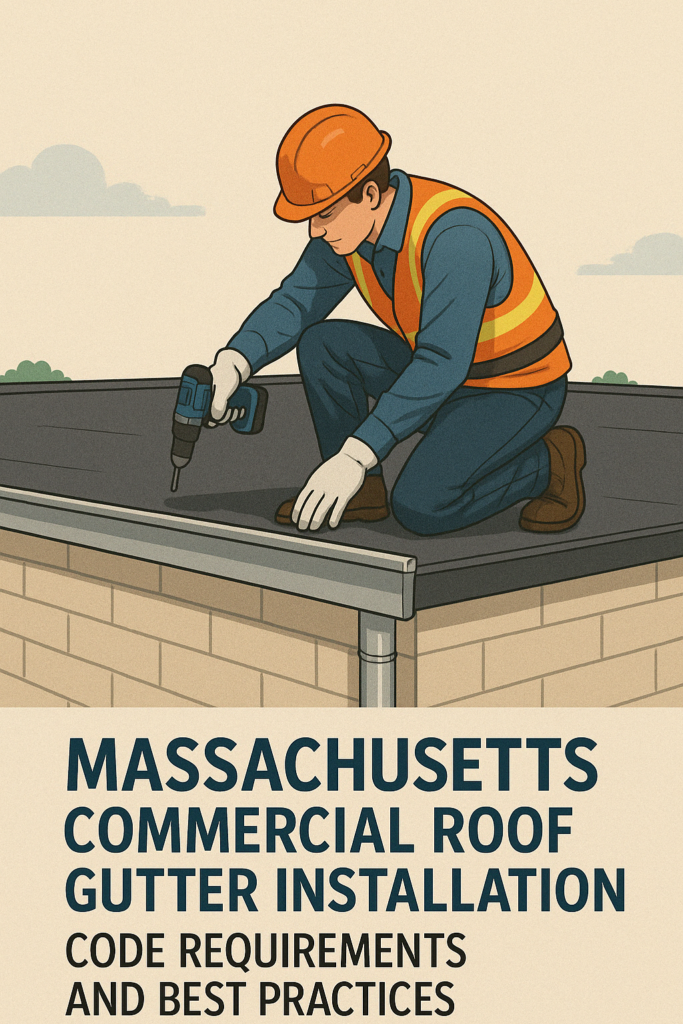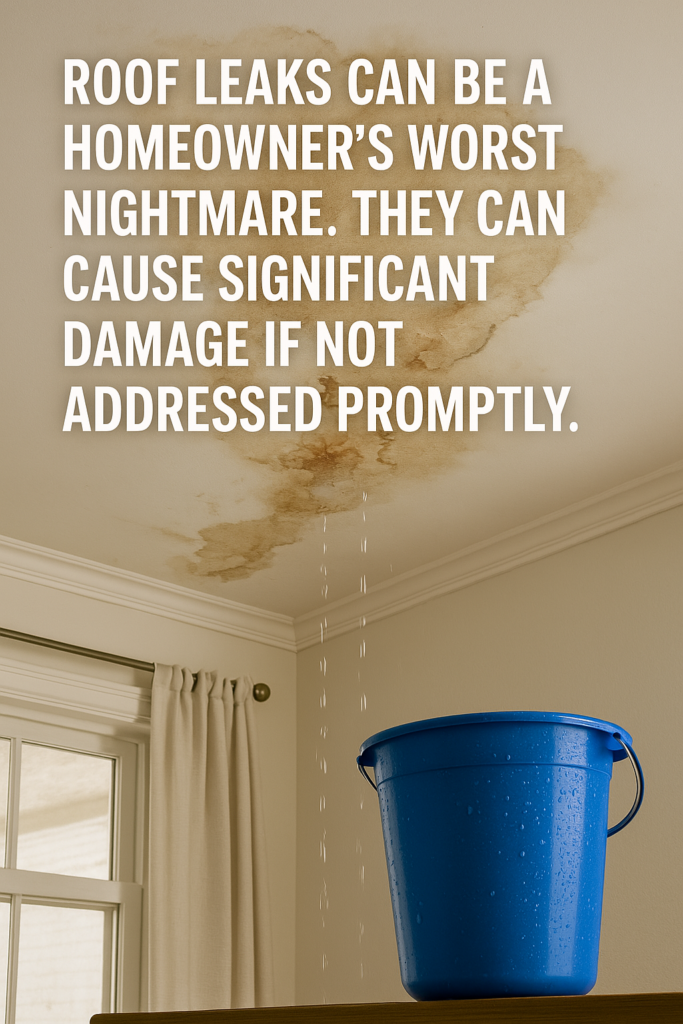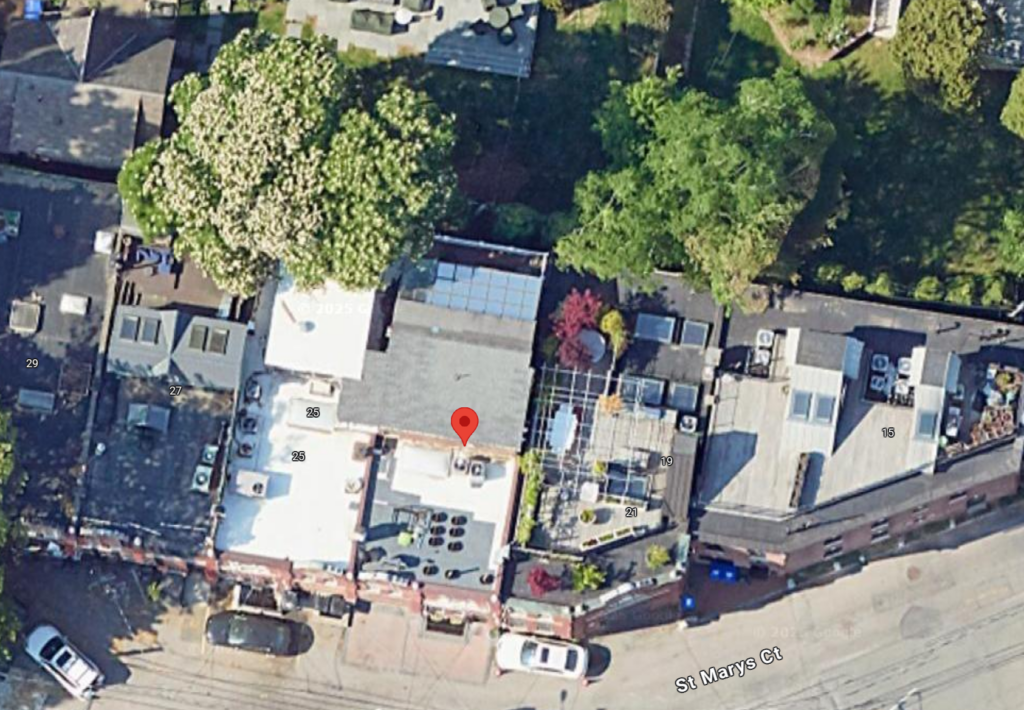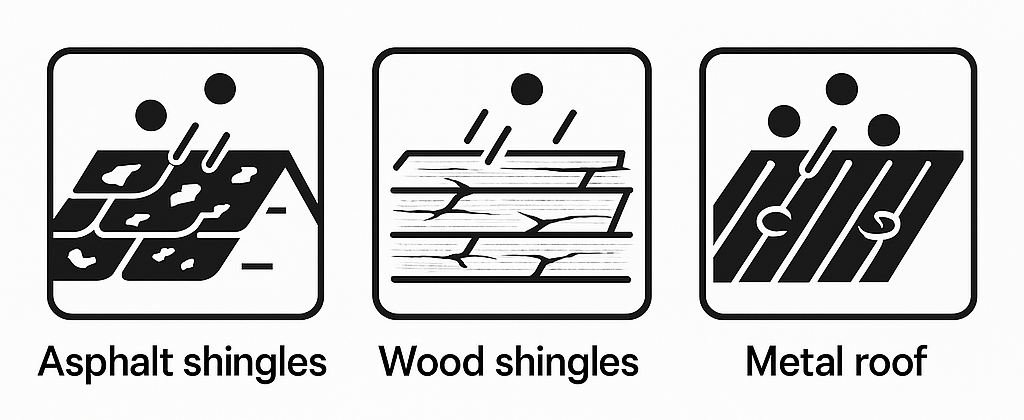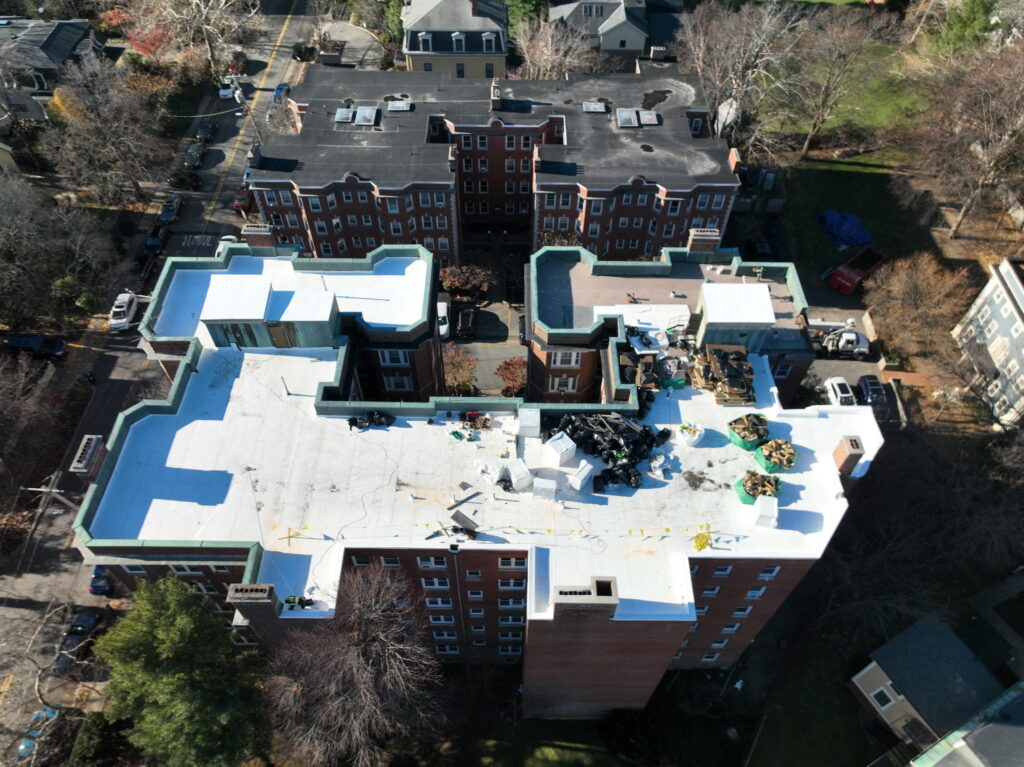Top Residential Roofing Solutions: Your Guide to a Durable, Beautiful Home Roof
Reading Time: 10 minutesNavigating the myriad of residential roofing options is no small feat. How do you strike the perfect balance between long-lasting materials, aesthetic appeal, and smart investment? This guide offers a straightforward look at the essentials of residential roofing—from understanding material choices and maintenance must-dos to selecting the best contractor for your project. Expert advice lets you make informed decisions about your home’s roofing needs.
Understanding Residential Roofing
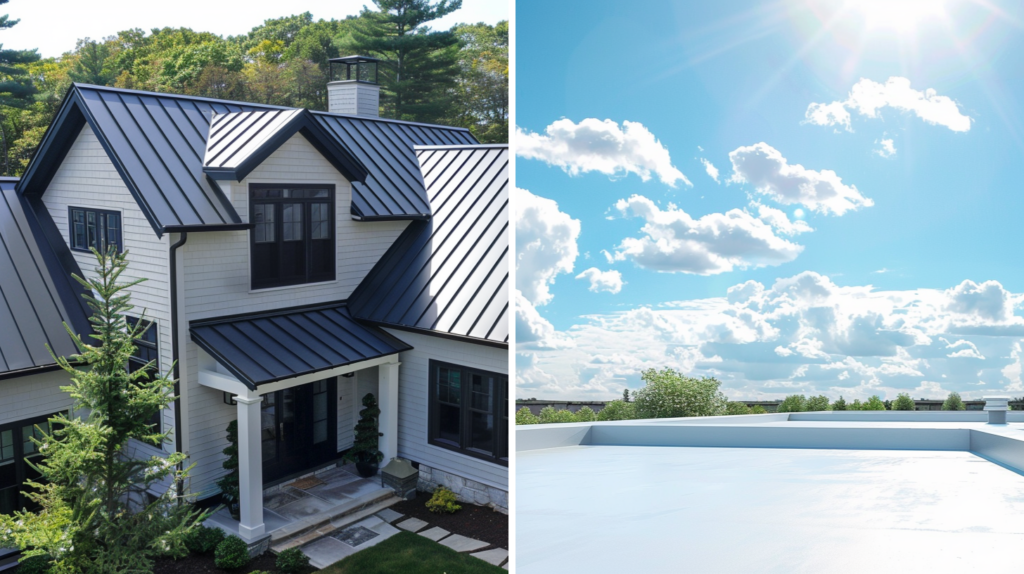
Whether old or new, your roof is more than just a protective shield; it’s a significant player in your home’s curb appeal—quality residential roofing safeguards against extreme weather conditions, from scorching sun to howling winds and pouring rain.
Your home’s functionality and aesthetic appeal largely depend on your choice of roofing material, be it asphalt shingles, metal roofing, or PVC roofs. It’s equally important to select experienced and dependable residential roofing contractors to ensure your home and its possessions are well-protected.
The Purpose of Residential Roofing

A well-constructed roof does more than keep you dry. It is a barrier against numerous threats, including harsh weather, fire, and other environmental hazards. Besides offering protection, the roof also helps maintain a comfortable living environment. A well-insulated roof keeps your home warmer in winter and cooler in summer, contributing to a cozy and comfortable living space no matter the season.
Additionally, your roof significantly contributes to your home’s aesthetic appeal. The roofing material and design can influence how your home integrates with its surroundings. Whether you prefer the rustic charm of cedar shake roofing or the sleek look of metal roofing, your choice can enhance your home’s aesthetic and value.
Common Residential Roofing Problems
But what happens when your sturdy shield, especially an old roof, develops cracks in its armor? Replacing an old roof brings its own set of challenges and considerations, such as deciding between hiring independent contractors or roofing companies and weighing the advantages and disadvantages of each. This decision often involves considering home equity to fund the replacement, alongside the critical choice between repair and full replacement. Common roofing problems such as leaky roofs, temperature-related damage, and shingle curling can pose serious issues. Leaks can lead to mold growth, rotten framing, and damaged insulation, often requiring comprehensive repairs.
Meanwhile, asphalt shingles, famous for their affordability and aesthetics, are sensitive to temperature changes. Extreme weather conditions can lead to the following:
- expansion
- contraction
- cracking
- reduced waterproofing
Shingle curling, whether at the edges or the center, indicates potential leaks and property damage, suggesting that a roof replacement may be necessary.
Popular Residential Roofing Materials
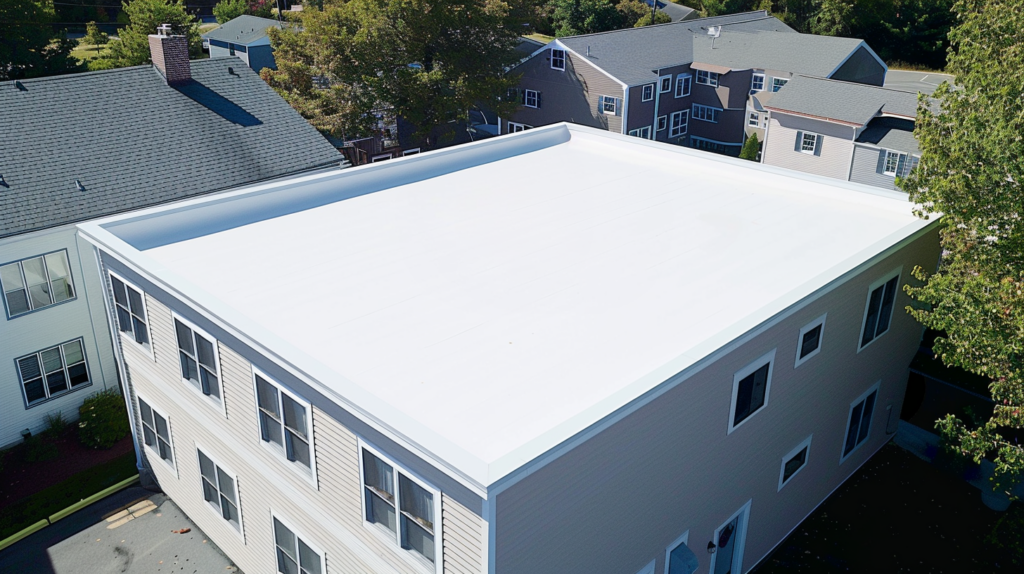
So, which options do you have available for choosing roofing materials? Commonly used materials for residential roofing include asphalt shingles and PVC roofs. PVC roofing provides a wide range of aesthetic options. If you prefer a more natural look, cedar shakes are popular for their natural beauty and contribution to a home’s visual appeal. But remember, choosing quality roofing materials can significantly enhance a roof’s durability, lifespan, and even a home’s curb appeal.
Introduction to Residential PVC Roofing: A Durable Choice for Homeowners
Imagine a roofing material that combines durability, quality, and ease of installation. Enter PVC roofing, a top choice for residential flat roofs. Designed to withstand the test of time, PVC roofing brings together the best elements of durability and quality, making it an ideal choice for homeowners looking for a long-lasting roofing solution.
The Aesthetics of Residential PVC Roofing: Enhancing Your Home’s Appeal
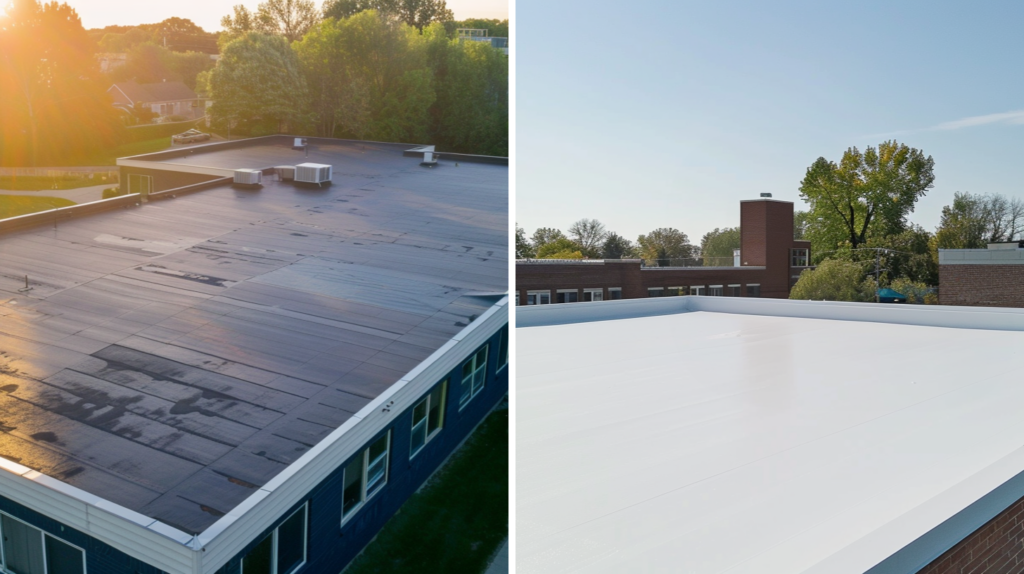
However, it’s not solely about durability and quality. PVC roofing can also give your home a visual upgrade. Here are some benefits of PVC roofing:
- Can improve the visual appeal of your home
- Adds a style and sophistication that sets your property apart from the rest.
Ease of Installation: Simplifying Your Roofing Project
One critical advantage of PVC roofing is its straightforward installation process. As a homeowner, this means less time spent on construction and more time enjoying your new roof. Plus, the simplified installation process can save significant labor costs, making PVC roofing a practical and cost-effective solution for your roofing project.
Energy Efficiency: Cutting Costs with PVC Roofing
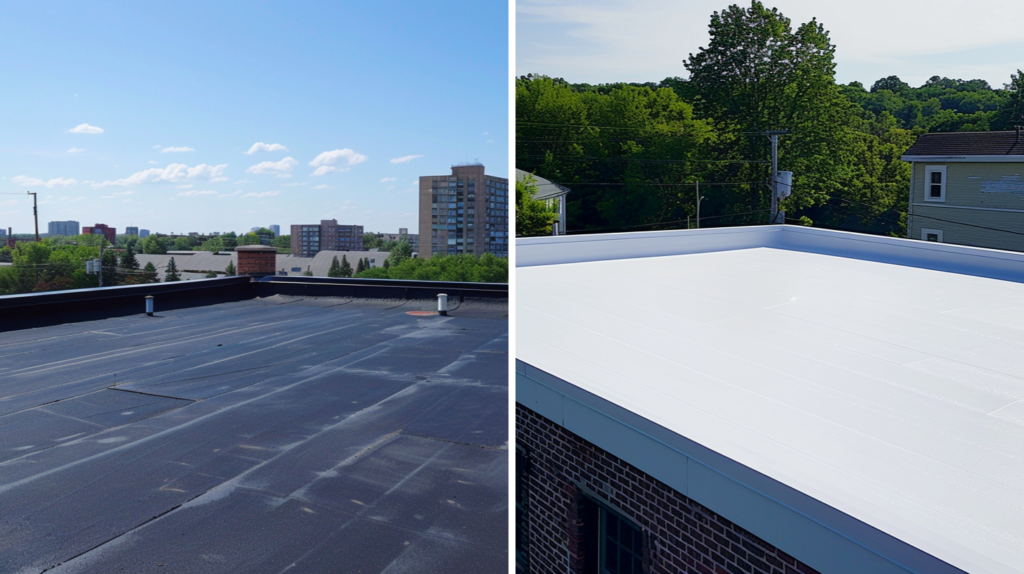
Yet, the advantages of PVC roofing extend beyond easy installation. This innovative roofing solution also contributes to energy savings. Thanks to its excellent insulation properties, PVC roofing can help reduce your heating and cooling expenses, making your home more energy-efficient and eco-friendly.
Quality Assured: The High Standards of PVC Roofing Materials
Quality doesn’t happen by accident; it’s born from:
- high intention
- sincere effort
- intelligent direction
- skillful execution
With PVC roofing materials, you can rest assured that you’re getting the highest quality. These materials undergo rigorous quality control measures to meet industry standards, ensuring durability and performance that you can count on.
Longevity of PVC Roofs: Investing in a Lasting Solution
Quality and durability often translate into longevity, and PVC roofing is no exception. With proper installation and maintenance, a PVC roof can last up to 50 years, making it a wise long-term investment for homeowners.
Therefore, if a durable roofing solution is what you seek, PVC roofing might be your ideal choice.
Weather Resistance: PVC Roofing’s Superior Performance
As a homeowner, you want a roof that can stand up to whatever Mother Nature throws at it, and PVC roofing delivers just that. Whether in extreme heat or freezing temperatures, PVC roofing demonstrates superior performance. Its exceptional weather resistance makes it a reliable choice for homes in various climates.
Low Maintenance: The Hassle-Free Advantage of PVC Roofing
In addition to durability, quality, and weather resistance, PVC roofing is low-maintenance. Unlike other roofing materials, PVC roofs require minimal maintenance, making them a convenient option for homeowners.
With PVC roofing, you can spend less time on upkeep and more time enjoying your beautiful home.
Eco-Friendly Roofing: The Environmental Benefits of PVC
Aside from its many functional benefits, PVC roofing contributes to a greener planet. This eco-friendly roofing option is recyclable, reduces waste, and promotes sustainable building practices.
Choosing PVC roofing is an investment in a high-quality roofing solution for your home and contributing to environmental conservation.
Fire Safety: PVC Roofing’s Fire-Resistant Properties
Every detail matters concerning home safety, including your choice of roofing material. PVC roofing boasts fire-resistant properties, enhancing the safety of your home.
This added layer of protection can give you peace of mind, as you know that your roof can withstand potential fire hazards.
Cost-Effectiveness: Balancing Quality and Affordability with PVC
Quality, durability, and safety are all critical factors when choosing a roofing material, but let’s not forget about cost-effectiveness. PVC roofing offers a balance of high quality and affordability, making it an economical choice for homeowners.
Therefore, if a cost-effective roofing solution is what you need, PVC roofing might be the right fit.
Seamless Protection: The Watertight Advantage of PVC Roofs
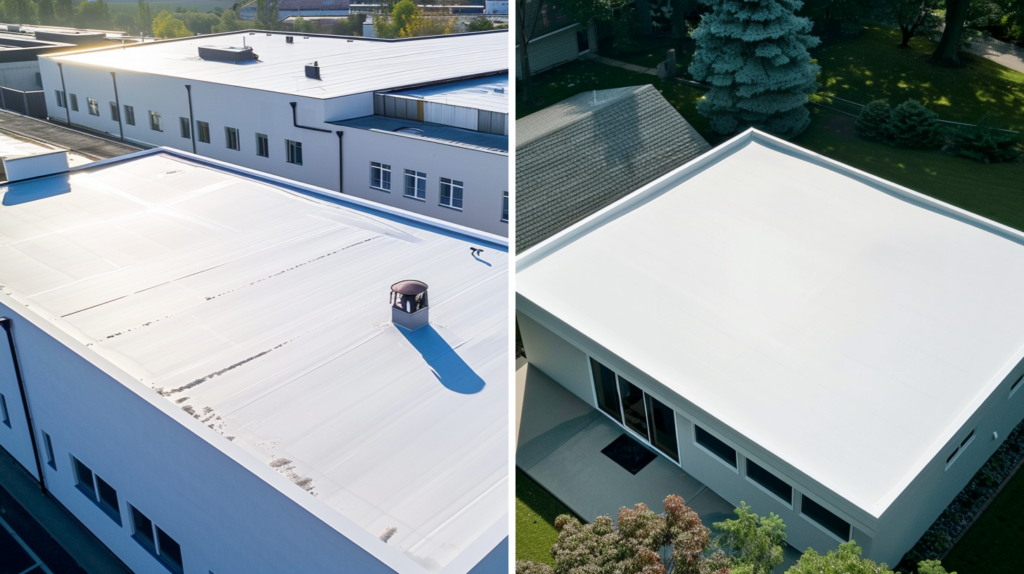
One of the key features of PVC roofing is its seamless protection. The heat-welded seams of PVC roofing provide a watertight barrier, protecting your home from leaks.
This watertight advantage ensures that your home stays dry and comfortable, regardless of the weather conditions outside.
The Flexibility Factor: PVC Roofing’s Adaptability to Building Movements
As structures move and shift over time, it’s essential that your roof can adapt to these changes. That’s where the flexibility of PVC roofing materials comes into play. These materials can adapt to building movements without compromising their integrity, making PVC roofing a reliable choice for the long term.
Innovation in Roofing: The Technological Advancements of PVC
Innovation is at the heart of progress, and roofing is no exception. PVC roofing is at the forefront of roofing technology, offering innovative features such as UV resistance and customizable designs.
Whether your priority is a unique roof design or a material resilient to harsh sunlight, PVC roofing caters to all your needs.
Choosing the Right Roofing Contractor
Selecting the right roofing material is only part of the challenge; finding the right contractor for its installation is equally important. Choosing experienced and dependable residential roofing contractors is crucial for protecting your home and its possessions. These professionals offer a comprehensive range of services, including roof repair, replacement, and inspections for roofing materials such as shingle, slate, tile, and cedar. They possess expertise in handling various roof types, from asphalt shingles to Spanish roof tiles, ensuring a durable and watertight roof. Additionally, they provide professional advice and guidance on material selection and construction, helping you make the best decision for your home. But how do you ensure you’re making the right choice?
Checking Qualifications and References
The first step in choosing local roofers is checking their qualifications. Make sure the roofer has the appropriate credentials to guarantee quality service. This includes verifying their license, demonstrating their understanding of industry best practices, and compliance with local building codes. Don’t forget to consider insurance, as it’s essential for protecting homeowners against potential liabilities and a hallmark of any reputable roofing contractor. When searching for roofing companies, prioritize those that meet these criteria.
Once you’ve checked their qualifications, the next step is to check their references. This involves looking at their previous work and speaking to past clients. Examining a contractor’s portfolio provides insight into their track record and the quality of their completed roofing projects. Reviews from past clients can also be instrumental in assessing a roofing contractor’s reliability and professionalism.
Comparing Estimates and Services
Once you’ve verified qualifications and references, compare estimates and services. Get bids from multiple contractors and cross-check their reliability and work quality. But remember, the cheapest bid isn’t always the best one. Look for a quote with the best cost, quality, and service balance. And watch out for low bids that could be indicative of substandard quality.
Residential Roofing – Replacement vs. Repair
Noticing signs of wear and tear on your roof presents you with an important decision: should you repair or replace it? This decision involves considering the roof’s age, the extent of damage, and the cost-effectiveness of repairs relative to replacement.
When replacing an old roof, homeowners must weigh the options between hiring independent contractors or roofing companies. Each choice has advantages and disadvantages, from personalized service and potentially lower costs with independents to more comprehensive warranties and project management with established companies. Additionally, financing the replacement through home equity can be a viable option, offering the opportunity to invest in your home’s value without upfront cash.
Signs Your Roof Needs Replacement
Recognizing when to replace your roof can be a time-saver and cost-effective in the long run. Signs that indicate the need for roof replacement include structural issues like cracks and damaged shingles and aesthetic problems such as an old and worn appearance or moss and algae.
Conducting regular roof inspections aids in the early detection of these signs, allowing for timely action.
When to Opt for Roof Repair
However, if the damage is minimal, roof repair can be a more cost-effective solution. Common roof repairs often involve shingle replacement and repairing damaged nails and metal sheets. Additionally, fixing flashings is another common issue that may need to be addressed..
For moderate damage confined to one side or area of the roof, partial reroofing is a viable option and can be less costly than total replacement.
Innovative Roofing Solutions for Your Home
Roofing serves protective functions and can increase a home’s energy efficiency, sustainability, and visual appeal. Today’s homeowners have a variety of innovative roofing solutions at their disposal, including professional roofing services, solar panel integration, and unique materials.
Solar Panel Integration
One innovative roofing solution gaining in popularity is the integration of solar panels into residential roofing systems, which can be considered a form of roof installation. This contributes to environmental sustainability and can lead to significant energy savings and reduced reliance on conventional power sources.
Solar shingles represent another innovative option, blending energy efficiency, sustainability, and improved home aesthetics compared to traditional clay tiles.
Residential Roof Maintenance Tips for Homeowners
While selecting an appropriate roofing material and contractor is crucial, consistent maintenance is essential to prolong your roof’s lifespan and prevent expensive repairs. From performing regular visual inspections to cleaning gutters and addressing minor issues promptly, a little preventative maintenance can go a long way.
All You Need to Know About PVC Roofing
Regular Inspections
Roof inspections should be done twice a year to anticipate and evaluate any damage from severe seasonal weather, ideally in spring and fall. In addition, you should conduct roof inspections after significant weather events and for asphalt shingle roofs every three to five years.
Performing an inspection before the onset of winter allows time for preventative maintenance, potentially averting emergencies during cold weather. Regular inspections also help identify small defects, like minor openings, that can lead to water infiltration, thereby preventing further damage.
Beyond these scheduled inspections, proactive checks during inspections for signs of leaks, water stains, and structural damage can prevent minor issues from escalating into major repairs. Timely detection of damage and maintaining structural integrity from maintenance technicians working on other systems ensures quick repairs, avoiding compounded issues.
Cleaning Gutters and Debris
Cleaning your gutters and removing debris from your roof is another crucial aspect of roof maintenance. Gutters are vital in directing water away from your home, so keeping them clean is essential to prevent water overflows that may damage your siding and contribute to roof and fascia rot.
Similarly, removing debris such as leaves and small limbs from your roof can prevent damage and conditions that lead to algae growth and wood rot.
Addressing Minor Issues Promptly
Finally, promptly addressing minor issues can prevent them from escalating into significant problems. Ignoring small roof problems, such as leaks or loose shingles, can lead to much bigger issues that are more expensive to repair.
Regular repairs can identify weak points before they cause significant damage and extend the roof’s lifespan.
Residential Roofing – Summary
In conclusion, residential roofing is more than just a functional component of your home. A well-chosen and well-maintained roof is vital to any home, from protecting your property against the elements to enhancing its aesthetic appeal and energy efficiency. Whether you opt for traditional materials like asphalt shingles and metal or innovative solutions like PVC roofing, the key is to choose quality materials, hire a reliable contractor, and commit to regular maintenance.
Frequently Asked Questions
Residential roofing protects your home from the weather, fire, and environmental hazards while also adding to its comfort and aesthetic appeal. It’s a vital part of keeping your home safe and beautiful!
Roofing problems like leaky roofs, temperature-related damage, and shingle curling are quite common and can cause major headaches! Watch out for these issues to keep your roof in top shape.
PVC roofing is a fantastic option for residential flat roofs. It offers benefits like easy installation, energy efficiency, low maintenance, and fire resistance. It’s a durable and quality choice!
Check qualifications and references and compare estimates from multiple contractors to choose the right roofing contractor for your needs. Good luck!
You can explore innovative roofing solutions for your home, such as integrating solar panels and using special materials like DeckShield. These options can provide both energy efficiency and durability.
Denis is the driving force behind ID Flat Roof, a leading company in Boston specializing in flat roof repair and installation for over 20 years.
Expertise:
Denis excels in PVC, TPO, EPDM, and rubber roofing. His meticulous approach ensures quality and customer satisfaction.
Innovation:
Denis incorporates cutting-edge solutions like skylights and solar PV roofing.




